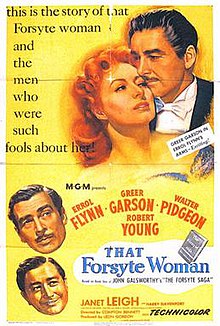Revisiting Favorite Books: The Forsytes and the Acquisitive Victorians
These days, creating a believable world for readers who have never known anything like it seems to be the province of fantasy and sci-fi. Yet John Galsworthy and the eponymous Forsyte Saga make a reader understand comprehensively what Victorian England was like. If you’re a lover of Dickens, you may be surprised to discover there really was a whole other level of culture from that in most of his stories.
You find out what the clothes were like, the landscapes familiar to that caste of Englishman (and woman), the (to us) peculiar routines of people who did nothing, with the exception of a few hours a week on the part of the men, and interminably tedious "calling" for women. (The movie poster was an adaptation of The Man of Property, the first novel in The Forsyte Saga by John Galsworthy)
Except for the military, men worked at desks and in boardrooms, women did no housekeeping, no childcare, little or no charity work. Like a perfectly arranged workshop, their lives were ordered, with a place for everything (and everyone), and everything in its place. Not many writers could hold modern attentions with such a world, yet it is more real than if it were shown on a movie screen.
The characters in their houses, the décor, the customs, the music and art and social events are so meticulously portrayed that the reader is like an eavesdropper. You see these people and hear them, but most impressive of all, Galsworthy takes you inside their histories and their hearts, and in the gradual way one comes to know the people in real life — not all at once.
I first read these books (for they were three novels and two "interludes" that join to make a narrative that covers about a century and four generations), I was in my teens. On average, I believe I’ve read them over again eight or ten times. Every reading renews my admiration for the incredible detail without tediousness that brings the characters to life. Every reading renews my astonishment at Galsworthy’s ability to read and portray the inner kernels of habit, tradition, instinct, knowledge, capacities or failings of every individual in the stories. I think he would make a psychoanalyst proud.
Rich in history, satire, philosophy, political analysis, above all, in sympathy, the stories of every man, woman, and adolescent are shown complete. Excess, if not forgiven, is always explained, courage recognized, pain and occasionally joy shown, as it were, in living color. These people have failings and make mistakes that are truly major and profound, but none is a real villain.
Themes are organically interlaced. The male protagonist Soames Forsyte is a bit of an antihero; he stands for the policies and follies that Galsworthy is at pains to ridicule, albeit with an understanding of the circumstances that tangle his characters in webs from which they cannot hope to escape — with a couple of notable exceptions.
Soames represents the acquisitive principle that according to the Victorians enabled Britain to become an empire. He is a lawyer whose cool headedness, intelligence, profit instincts, and lack of emotion have made him extremely successful, which is to say, he is very rich. His strengths prove to be his undoing when he succeeds in persuading the beautiful Irene Heron to be his wife.
Pages: 1 · 2
More Articles
- National Archives Records Lay Foundation for Killers of the Flower Moon: The Osage Murders and the Birth of the FBI
- Nichola D. Gutgold - The Most Private Roosevelt Makes a Significant Public Contribution: Ethel Carow Roosevelt Derby
- Oppenheimer: July 28 UC Berkeley Panel Discussion Focuses On The Man Behind The Movie
- Jo Freeman's Review of Yippie Girl: Exploits in Protest and Defeating the FBI
- "Henry Ford Innovation Nation", a Favorite Television Show
- Julia Sneden Wrote: Going Forth On the Fourth After Strict Blackout Conditions and Requisitioned Gunpowder Had Been the Law
- Jo Freeman Reviews: Gendered Citizenship: The Original Conflict Over the Equal Rights Amendment, 1920 – 1963
- Jo Freeman Writes: It’s About Time
- Jo Freeman Reviews: Lady Bird Johnson: Hiding in Plain Sight
- Women in Congress: Biographical Profiles of Former Female Members of Congress






